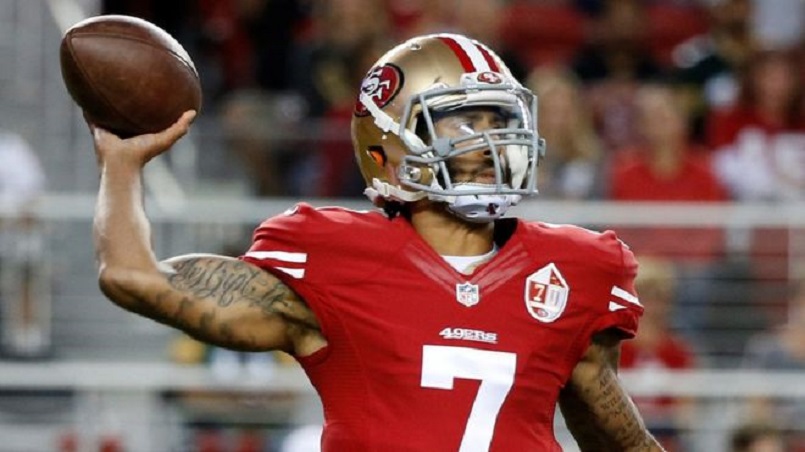
When American football player Colin Kaepernick refused to stand for the national anthem, he unleashed a storm of controversy that shows no sign of dying down.
The San Francisco 49er's quarterback stayed seated as The Star-Spangled Banner played in a pre-game ceremony in protest against what he called the oppression of black people in the US.
The gesture has provoked a huge reaction, with some applauding him as principled, others seeing him as disrespectful and unpatriotic. Here are some of the key responses.
#VeteransForKaepernick rally behind athlete
An often-repeated criticism of Kaepernick has been that his actions are offensive to members of the US military.
Guidelines say all Americans should stand and face the flag during the anthem - by not doing so, as the argument goes, Kaepernick was insulting people prepared to die for it.
Some former servicemen and women disagree, however, and have been offering their support using the #VeteransForKaepernick hashtag.
However backing for Kaepernick among the US military is far from unanimous.
In one widely shared response, Senior Airman Brian Kolfage, who lost three limbs in Iraq in 2004, said "I'll be sure to stand for the both us" next time the anthem played.
Meanwhile the Veterans of Foreign Wars of the United States group said "the American flag and our national anthem stand for something, and the Veterans of Foreign Wars of the United States salutes all who stand with us".
Fans burn quarterback's shirt
Angry fans of the 49ers have been posting videos of themselves burning Kaepernick jerseys.
"When you don't rise for the flag to show your respect for the men and women who fought and continue to fight for our freedom you start #losing #fans," wrote one.
Kaepernick led San Francisco to the 2013 Super Bowl, but since then his status in the team has declined and he has lost his starting place.
His team support his protest, saying "we recognise the right of an individual to choose and participate, or not, in our celebration of the national anthem".
Mexico Olympics athlete weighs in
One man who knows what it is like to be attacked for making a political gesture at a sporting event is Tommie Smith, the US sprinter who famously raised his fist in protest against racial discrimination during his gold medal ceremony at the 1968 Olympics.
Smith gave Kaepernick his backing. "He's being vilified in how he brings the truth out," he told USA Today.
"I support him because he's bringing the truth out, regardless of how done. If it's not done violently, at least he should be heard."
He suggested that Smith was only continuing a fight against systemic racism that was yet to be won. "There are a lot of battles to fight because it's a big, long war," he said.
Donald Trump enters the fray
The Republican presidential nominee gave a typically forthright response, calling Kaepernick's action a "terrible thing".
"Maybe he should find a country that works better for him," Mr Trump told KIRO radio in Seattle. "Let him try. It won't happen."
There has been no word yet from rival Hillary Clinton.
Kaepernick himself is no fan of either candidate. Asked whether he had deliberately timed the protest to coincide with election year, he said both "represent the issue that we have in this country right now".
He went onto call Mr Trump "openly racist" and cited Mrs Clinton's description of black children as "super-predators".
'All Lives Matter' rears its head
In his reaction, Jerry Rice, who won three Super Bowl championships while with the 49ers, took a similar line to many, backing Kaepernick's freedom to express himself while disagreeing with the method.
But three little words made Rice himself come under fire.
The phrase "All Lives Matter" has proved hugely toxic, with critics saying those who use the phrase are at best missing the point of the debate, at worst being outright racist.
Kaepernick has been a vocal supporter of the Black Lives Matter movement and referenced police brutality in explaining his action.
Digging through the history books
The row has triggered a complex debate about free speech and patriotism, the sport and the military, and for some commentators was a chance to examine the meaning of the Star Spangled Banner itself.
The anthem is best known for its opening verse, which is normally the only one sung. It was written in 1814 by Francis Scott Key, after witnessing the British bombardment of Fort McHenry in Baltimore.
But a lesser known third verse, which has the line "no refuge could save the hireling and slave" is often interpreted as celebrating the deaths of slaves who died siding with the British.
Writing in the Root, Jason Johnson calls the song "one of the most racist, pro-slavery, anti-black songs in the American lexicon"
